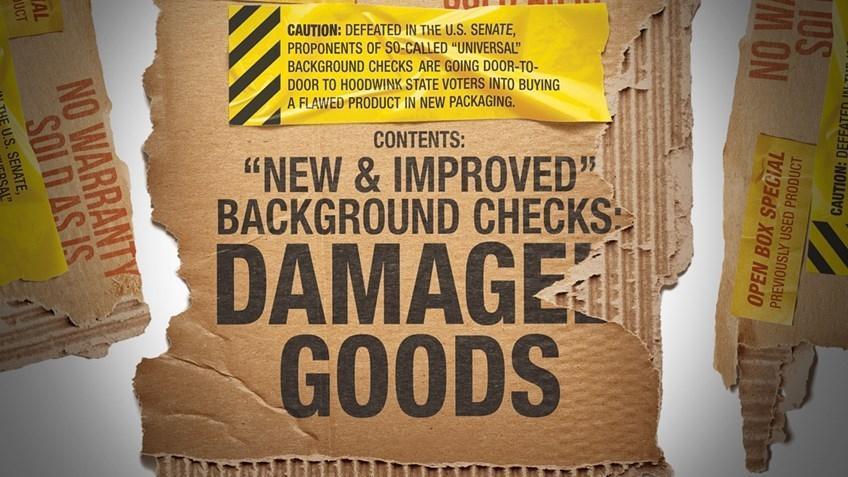How do you sell something that for generations hasn’t lived up to its claims; that has failed so horribly that one of its side effects is a higher homicide rate; that, when implemented, turns good, law-abiding people into helpless victims; and that has failed so openly that an overwhelming majority of Americans have rejected it? Better marketing, of course.
(NOTE: This feature written by Frank Miniter appeared in the April ’16 issue of NRA America’s 1st Freedom, one of the official journals of the National Rifle Association.)
The only hope is to repackage the product and loudly deny that you’re selling the same failed ideas in a shiny new box. This is the position the gun control movement has been in for a long time.
Anti-gun advocates won’t change the product, but they do persistently change the marketing. They can afford to do this because, though gun control has failed again and again in the marketplace of ideas, its peddlers are flush with cash—thanks to a few mega-wealthy individuals.
To accomplish this, gun control groups hire lobbying and marketing firms. They use focus groups to test ideas and sales pitches, and then, when the failed product begins to sound fresh and palatable, they take the idea to the “mainstream” media who broadcast it to the public.
This is what led to the current push for so-called “universal” background checks. This idea didn’t pass Congress in 2013, but it was successfully, and very misleadingly, sold to Washington state voters soon thereafter. This same product is now being marketed to voters in Nevada and Maine—and next, quite likely, to wherever you live.
They like the “universal” background check idea because it can seem unthreatening, even sensible. America’s 100-million-plus legal gun owners, after all, don’t want bad guys or the mentally ill to get guns any more than the editorial board of The New York Times does. So this seems like reasonable common ground.
The problem is gun owners can’t trust the people pushing this expansion of government regulation. They can’t trust them to not abuse the system. They can’t trust them to make the system actually work fairly and in a speedy fashion. And most importantly, they can’t trust them not to come back the very next day and call for more gun laws, including national gun registration. And as you read the legislation you realize the only realistic way to enforce a “universal” background check law is with a gun registry, you begin to see what these regulations are really about.
After all, they know that the only way to enforce their background check mandate is for every transfer to be registered with the government. In fact, Obama’s own Department of Justice published a memo stating the administration believes “universal” background checks “won’t work without requiring national gun registration.”
Not that gun registries work—even Canada couldn’t implement a working gun registry. And throughout history, registration has lead to confiscation in nearly every single case.
Anti-gun advocates won’t change the product, but they do persistently change the marketing.
And that is the real issue here. All their talk of Australia and Great Britain simply reinforces this point.
The real goal of Michael Bloomberg, Barack Obama, Hillary Clinton and the leadership of the anti-gun movement is to control, limit and prohibit gun ownership by everyone, not just criminals or the mentally ill as they falsely claim. Gun owners can’t afford to buy into their lies about “common-sense” or “reasonable” approaches because there is nothing “reasonable” or “common sense” about their ultimate end game.
Now, any rational person also pauses here to acknowledge that the “universal” background check idea can never really be “universal,” because criminals, by definition, won’t undergo background checks to obtain firearms. Instead, criminals will get guns how the Bureau of Alcohol, Tobacco, Firearms and Explosives (ATF) says they largely do now—by getting someone who can pass a background check to be a straw purchaser for them, by purchasing them on the black market or by stealing them.
Also, it is already illegal for someone to knowingly sell a gun to someone who can’t legally own one. If the Department of Justice (DOJ) wanted to increase the deterrent effect of this law they could very publicly assign a task force to investigate and prosecute anyone who knowingly sells a gun to a criminal—and make sure the media hears about it when charges are filed.
Still, even though President Barack Obama has pushed the “universal” background check idea to regulate the sales made privately by average American gun owners instead of targeting the bad guys with his DOJ, many gun owners might still be willing to undergo background checks for private gun sales if it might make it a little harder for bad guys to get guns.
Unfortunately, it is not so simple. Michael Bloomberg isn’t spending millions of his dollars to fund the background-check expansion in order to prevent a few criminals from buying guns. When you dig into this effort, you find that something much bigger is going on.
Continue reading at NRA-ILA


